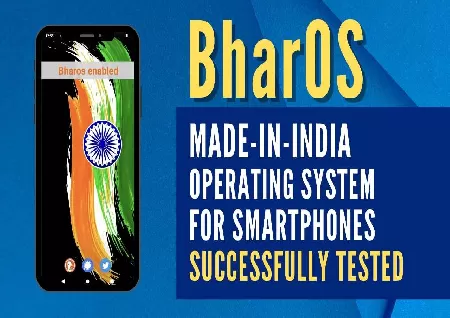BharOS India indigenous mobile operating system by IIT Madras 6 key points

Indian mobile operating system BharOS developed by IIT Madras 6 crucial points: BharOS is a crucial milestone in India's development of reliable domestic digital infrastructure. Here, we've outlined the essentials for learning more about the native mobile operating system. A startup that was incubated at IIT Madras has developed a mobile operating system with the aim of building a "self-reliant India." Its creators have given it the name "BharOS" and assert that it would benefit the 100 crore mobile phone users in the country. Here, we've outlined the essentials for learning more about the native mobile operating system.
1. According to its developers, JandK Operations Private Limited (JandKops), the BharOS mobile operating system was created to provide users more freedom, power,and flexibility, which can only be customised to meet their demands. According to the technology, people' perceptions of security and privacy on mobile devices would fundamentally shift.
2. There are no pre-loaded apps with this mobile OS. Customers will obtain the most of the storage space, unlike Android, where OEMs give the phone with certain native and pre-installed Google apps. If one uses BharOS, they won't be forced to utilise programmes they might not be comfortable or knowledgeable with.
3. Just as with Android devices, you will be able to get Native Over the Air (NOTA) fixes. The creators claim that the NOTA updates are downloaded and installed on the device without user input.
4. The OS will also provide users with access to dependable programmes from privately run app stores that are particular to certain organisations (PASS). The developer claim that PASS gives users access to a carefully curated collection of apps that have passed strict testing and meet the organization's privacy and security standards.By knowing that the programmes they download are safe, users may feel comfortable. They have been examined for any potential privacy or security flaws and are secure to use.
5. Only specific institutions "whose users handle sensitive information that requires secret communication through restricted applications on mobile" would be permitted to adopt BharOS.
6. Information on power monitoring, home screen widgets, notification settings, and privacy settings has not yet been made public.
Related queries to this article
- Indian mobile operating system
- BharOS
- IIT Madras
- sensitive information
- secret communication
- restricted applications
Read more articles and stories on InstaSity Latest News.